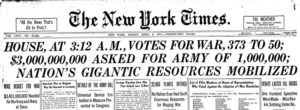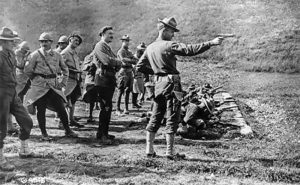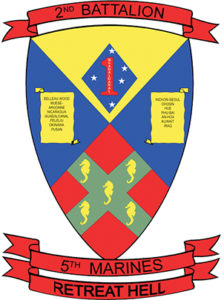Previous post

One hundred years ago today, Armistice was declared between the Allies and their last opponent, Germany. Armistice Day became Veterans Day in 1954 to honor all veterans. And while that is noble, World War I has faded from memory. Indeed, not until this year was there a national memorial in Washington D.C. to The Great War. Today, I publish a letter from a young Marine who was captured in No Man’s Land in Verdun, France, on April 19, 1918, and who barely survived eight months as a POW.
The young man is my great-uncle, Ray Howard Aseltine. His younger sister, Mildred Aseltine Rippel, is my maternal grandmother. This is his story. I will provide links within the text to relevant sites for further information. I’ve not corrected for spelling in Ray’s letter.
********************************************************
The first question people ask me when they discover I have been a prisoner of war is, “How did you feel when the Germans captured you?” All I can truthfully say is, “I just didn’t—” I wasn’t conscious of any feeling. I often wondered after I was in the prison camp why I didn’t kill myself before they got me. Well again, I just didn’t. It’s not a all easy to describe one’s feeling while a prisoner and I guess, on the whole, it’s better to forget one’s thoughts; for the worst kind of a ghastly night-mare is a beautiful fairytale compared to the horror of eight months spent in a German prison camp.

My home is in Michigan, but I was visiting in St.Louis when war was declared on Germany. The next day I enlisted as a member of the 18th Co. 5th Regiment, 2nd Division. I was sixteen but gave my age as nineteen and luck was with me. I was accepted. After four months training at Paris Island, South Carolina, we were sent across and there received six months of good, hard training in France. We were the first Marines over and the first to relieve the French. Our first fight was at Verdun.
On the 19th day of April, Lt. Brady sent ten men out on patrol to gather information. I was one of the ten. On No Man’s Land we ran across about one hundred Germans and a fierce fight took place and lasted about three-quarters of an hour. Sergeant Wichenbaugh was badly wounded but this did not prevent his carrying in a Lieutenant, who was in a serious condition and who died three days later. For this, Wichenbaug received the D. S. C. and the Crois de Guerre.
Eight of the ten boys were killed, leaving Gunnery Sergeant Butler and myself. We were wounded and taken prisoners. I had thirteen wounds in my leg. The Germans lined up to shoot us but reconsidered and took us prisoners in the hope of getting information from us. That was on April 19, 1918, at midnight. They walked us two solid days without food or sleep, then took us to a German officer where we were questioned day and night. We were put in a little room, just large enough to turn around in, and kept there eight days and fed once in twenty-four hours on bread and water. This was in Metz. We were then sent to Conflans and questioned steadily for one solid week. Then we were sent to punishment camps. I was sent to Darmstadt where I did three months hard laber on a diet of black bread, made of potatoes and sawdust, and a cup of acorn coffee. There we were fed twice a day. During this time the guards practiced every conceivable brutality; their favorite pastime being that of knocking down and beating the men who were slowly dying of starvation. There were about one hundred Americans at this prison camp. When we first arrived there the Germans took all our clothes, put the most awful things on us, including wooden shoes, and lined us up in front of what seemed to me like half of the German army; and there explained that this was the way the Americans were being sent over to fight – that they had no leather for shoes and no proper clothing.
Up to this time I had received no medical attention except paper bandages on my leg. A kind English boy dug the piece of grenade out of my leg with a pen knife. We worked about twelve hours a day. On a detail one day, while carrying a sack of potatoes (these sacks weighed two hundred pounds) a young fellow dropped from weakness. The German guard beat him to insensibility with his rifle. That was a common occurrence. On the streets the German children and women greeted us with sneers and would often spit at us. After three months here I was sent to the worse camp in Germany – Limburg, on the river Lahn. There the prisoners were made to work in coal mines, on the roads, and splitting rocks. I was among the latter. My prisoner companions, French and Russian. We were only fed once a day here – one slice of black bread and one cup of acorn coffee.

The men who worked in the coal mine began their work at five in the morning and continued until six at night; then they had one hour off and were sent back for four hours more of work. This they did without being given either change of clothes or soap with which to clean themselves. In the eight months I was a prisoner I was never given a change of clothing. My mother had been notified of my death at the time of my capture and four months later received word that I was a prisoner. She immediately sent me clothes and food but I never got a thing.
After two months of this horror, during which time I lost eighty pounds, I became so weakened that one day, while carrying the potato sack, I fell. A Russian guard sent me to a German hospital. Here I lay absolutely without medical aid of any sort. The hospital was little better than the prison camp. During one day and night there, twenty-three allies died of starvation. The Red Cross, acting from Berne, Switzerland, sent us thirty pound packages every week; but we were lucky if we got one a month of them. However, the fact that I am alive, I owe to the Red Cross and its help; and all that I can put into words is but a small portion of the gratitude I feel for that wonderful organization. The first piece of soap I had seen in Germany was received form the Red Cross. I was offered twenty-five marks (about five dollars in our money) by a German officer for a five-cent piece of Armour’s soap. I refused to sell it. When the Germans found these packages were coming regularly, they tried to become friendly in the hope of buying some food from us. The Red Cross sent me an entire outfit of clothing to this hospital.
During all these months I had to listen to the jeering remarks of Germans regarding the Allies and their boasts that only the Germans would win. We knew better and that kept our courage up. When the first news of the Armistice came, the Germans took it as a joke. Big riots took place in the streets of Goblenz, in which thousands of Germans were killed. After the signing the prisoners were turned loose and I went to Limburg. While out walking one day I was stopped by a German who asked me if I had forgotten him. I didn’t know, at the moment, that I had reason to remember him but he soon told me it was he who had taken me prisoner and showed me the photo of myself. He gave me the photo which I sent home to my mother. After leaving him I was accosted by an elderly German who seemed anxious to explain his great disappointment that America had been brought into the war. Germany and America should always have continued friends he explained. I gave him reasons for thinking otherwise but I can’t say I persuaded him to agree with me. He told me he had a beautiful daughter whom he would be glad to have me meet, and in the event of our marrying, he’d gladly taken me into business with him. He was a photographer. I suggested he photograph me at my happiest moment – leaving Germany. I returned to Metz where I saw the German prisoners receiving pay, being well fed and dressed, also provided with good sleeping quarters. I felt I would like to have put them through some of my experiences but I was so happy at being free that I didn’t let myself dwell much on the past. I was too much concerned with making plans for the future.
I got to Toule, France, the day before Thanksgiving and was sent to a Casual camp; from there to Savaney. I shall never forget my Thanksgiving dinner. It seemed I must be looking at a moving picture. I asked a fellow to hit me three times to see if I was awake. I was – and I nearly made myself sick eating. I arrived in New York on the 24th of January, 1919. We had a stormy voyage home but we got here, which is the thing I am certainly grateful for. I’ve been at the Riverside hospital for some time but I’m going home on a thirty day furlough – home to see the folks who have been waiting all these months. I am going back to school when I get my discharge from the army. There are about twenty-five of us alive of the three hundred in the 18th Co. We lost one of the bravest captains of the war, Captain Wass. It’s all over now and the suffering is only a memory but I wouldn’t give back one day of it all as my bit toward winning the Big Fight.
*********************************************
In a bitter-sweet post script, this young man did return to finish school. He fell in love, got married and had three sons. However, due to the lingering effects of what he endured during the war, he passed away on February 14, 1927, just 8 short years after writing this letter.

featured image a composite by Darleen Click using US Gov recruitment poster held in public domain
Liberals/progressives 100 years ago called it THE WAR TO END ALL WARS.
Serious question Have progressives ever been right?
As a former 5th Marine (A/1/5) who caries several scars given me by Chm Mao’s boys while fighting JFK’s was over half a century ago. I swear there have been at least 5 wars in the last 100 years.
I expect my grandsons to see war. As will their sons!
About the only good thing I can say about this is that he did get to come home, and have a good – but way too brief – life afterwards.
Thank you Darleen. What an incredible letter.
Thank you for posting this.
5 Comments